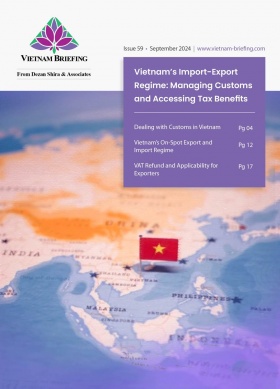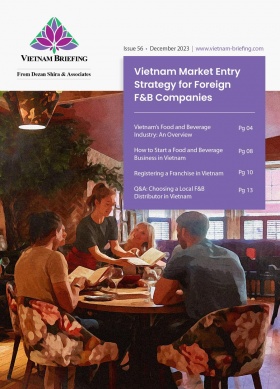Foreign Investment Considerations for Project Companies in Vietnam
Vietnam has become an attractive destination for foreign investment, especially in sectors like manufacturing, technology, and infrastructure. However, specific regulatory requirements and restrictions apply to foreign investors aiming to establish or acquire project companies within the country. Understanding these constraints can help investors navigate the investment landscape and mitigate potential risks. Here’s a brief overview of foreign investment considerations for project companies in Vietnam.
Also Read: Company Setup Process in Vietnam
Investment restrictions
To invest in a project company in Vietnam, foreign investors must meet several criteria. Primarily, the investment project must not fall under the prohibited business lines in the Prohibition List, and it must comply with market access conditions under the Foreign Investor Market Access List. This list details conditions such as limitations on foreign ownership, scope of activities, and investor qualifications. For sectors not on these lists, foreign investors generally enjoy the same market access as domestic investors.
Foreign investors may benefit from Vietnam’s bilateral and multilateral trade agreements, including commitments under the World Trade Organization (WTO), the Comprehensive and Progressive Agreement for Trans-Pacific Partnership (CPTPP), the ASEAN Comprehensive Investment Agreement, and the Japan-Vietnam Economic Partnership Agreement. These treaties may provide certain protections or relaxed conditions, promoting smoother entry for investors from member countries.
In foreclosure events, such as the enforcement of security over shares, foreign investors or creditors are also subject to Vietnam’s investment restrictions, particularly in business lines with conditional market access. For such transactions, compliance with applicable market access limitations remains mandatory.
Under Vietnam’s Law on Investment 2020, foreign and domestic investors share the same market access conditions, except where Vietnam’s international agreements limit foreign market access. Foreign investors may invest in Vietnam through commercial presence if domestic investors can, provided they avoid (i) prohibited sectors and (ii) restricted sectors on Vietnam’s Negative List for Market Access.
According to Decree 31/2021/ND-CP, dated March 26, 2021, the principles for applying market access restrictions to foreign investors in Vietnam are as follows:
-
Investors from non-WTO countries/territories: Foreign investors from countries or territories that are not WTO members are generally subject to the same market access conditions as those from WTO member countries, unless Vietnamese law or an international treaty between Vietnam and the investor’s country provides otherwise.
-
Investors from countries with an international investment treaty: Foreign investors covered by an international investment treaty that grants more favorable market access conditions than those offered by Vietnamese law shall be subject to the conditions under that treaty.
-
Investors with access to multiple international treaties with differing conditions: Foreign investors with access to multiple international treaties may choose to apply the market access conditions from any one of those treaties across all relevant business sectors. Once they choose a specific treaty’s conditions, they must comply with all provisions under that treaty.
Thus, market access conditions (including conditions on capital ownership ratio) shall be implemented in accordance with the provisions of international investment treaties as provided by Decree 31/2021/ND-CP.
Investment permissibility
Foreign investment is allowed if:
- The service is uncommitted by international treaties but permitted by Vietnam’s laws and not in (i) prohibited or (ii) restricted sectors.
- The service is committed in international treaties and not in (i) prohibited or (ii) restricted sectors.
Categories under WTO commitments
Vietnam’s commitments with the WTO outline four categories for foreign investors:
- Committed: Full foreign ownership is permitted.
- Restricted: Ownership limits and other restrictions apply.
- Unspecified: Requires ministerial approval and possible additional licensing.
- Uncommitted: Needs ministerial approval and additional licensing.
Business lines
- Prohibited lines include state monopoly goods, marine life harvesting, public security, judicial services, and weapon manufacturing.
- Restricted lines encompass media, banking, insurance, education, natural resource extraction, and certain energy, transportation, and healthcare services.
- Foreign investors may also need specific sub-licenses for conditional sectors.
Also Read: Set Up Requirements for Projects Requiring Special Approvals
Insurance restrictions
Foreign insurance companies are permitted to offer insurance over project assets in Vietnam, provided they meet strict requirements. They must be based in a country with an applicable international treaty with Vietnam and fulfill eligibility criteria. These criteria include licensing, financial stability standards, credit ratings, and profitability records. Foreign insurance policies are generally limited to non-life insurance, and only foreign-invested companies or foreign individuals working in Vietnam can purchase policies directly from foreign insurers. The WTO’s Working Party on the Accession of Vietnam (WT/ACC/VNM/48/Add.2) provides: “After five years from the date of accession, non-life branches of foreign insurance enterprises shall be permitted, subject to prudential regulation.”
Vietnamese law allows for reinsurance through local companies under the Law on Insurance Business, which may offer an additional layer of protection for foreign-secured creditors.
Database of insurance business activities
The 2022 Law on Insurance Business provides that investors, including foreign insurance companies, reinsurance companies, and foreign branches in Vietnam, are responsible for building a database of insurance business activities. Decree No. 46/2023/ND-CP, dated July 1, 2023, provides detailed requirements for these databases as follows:
- Licenses to establish and operate, and licenses to establish a foreign representative office in Vietnam;
- Records on financial situation and business activities; and
- Information on competent personnel and management structure of the insurance enterprises.
Insurance enterprises, reinsurance enterprises, foreign branches in Vietnam, insurance brokerage enterprises, insurance auxiliary service providers, and mutual organizations providing micro-insurance are also responsible for providing information on insurance buyers, insured persons, insured objects, insurance agents, and other relevant information to build a database on insurance business activities.
Worker restrictions
For project companies needing to hire foreign experts or executives, Vietnamese law stipulates stringent rules to protect the benefits of local workers. Pursuant to Article 152 of the 2019 Labor Code, the conditions for recruiting and employing foreign workers to work in Vietnam include:
- Foreign workers may only be recruited to work in managerial, executive, expert and technical positions that Vietnamese workers cannot meet according to production and business needs.
Before recruiting foreign workers to work in Vietnam, recruiters must explain the need for labor and obtain written approval from a competent state agency. - For contractors, before recruiting and using foreign workers to work in Vietnam, they must specifically declare the job positions, professional qualifications, technical skills, work experience, and working time that require the use of foreign workers to implement the bid package and obtain written approval from a competent state agency.
On September 18, 2023, the Government enacted Decree No. 70/2023/ND-CP, amending and augmenting specific provisions outlined in Decree No. 152 concerning the recruitment of foreign workers to the country, as well as hiring and oversight of Vietnamese employees working for foreign individuals and entities in the country. For more information, read our article: ‘Applying for a Vietnam Work Permit: Guidelines for Foreigners and Employers‘.
A work permit is also mandatory for foreign employees in most cases, although some exemptions may apply based on specific treaty agreements or other qualifications.
Equipment import restrictions
Importing project equipment into Vietnam is feasible but requires adherence to specific import regulations. In addition to any necessary import licenses, foreign investors must pay applicable duties on imported equipment. The process ensures that project equipment aligns with Vietnamese standards, safeguarding the market against substandard or unsafe imports.
Core provisions of Decree 18: Adherence to Vietnam’s import regulations for used machinery
Decision 18/2019/QD-TTg, along with its 2022 amendment, regulates the import of used machinery and technological lines into Vietnam. The decision stipulates key definitions and import eligibility requirements for both technological lines and individual machines. Machinery is defined as a single, complete structure that serves a specific purpose, while a technological line refers to a system of interconnected machines designed for synchronized operation in a fixed setup.
Technological lines must achieve at least 85 percent of their design capacity and not exceed 15 percent of their design consumption level for materials or energy. Used machines, on the other hand, generally must not be older than 10 years, though age limits can extend to 20–25 years for specific sectors. The import process requires submission of additional documents beyond standard customs requirements, including an Enterprise Registration Certificate, an inspection certificate from a licensed organization, and a translated and legalized manufacturer’s certificate if the machine originates from a G7 country or S.Korea.
Special cases allow for the import of machines exceeding age limits if they meet the 85 percent performance and 15 percent consumption standards, provided the importer obtains approval from the Ministry of Science and Technology (MOST). To ensure compliance, importers should conduct thorough due diligence on the machine’s specifications and select a trusted inspection company with relevant expertise. A legal advisor is also recommended to help navigate the complex process—from identifying requirements to liaising with the MOST, inspection partners, and customs authorities—ensuring adherence to Vietnamese regulations and a smooth importation process.
Nationalization and expropriation laws
Vietnam’s constitution and investment laws recognize and protect the ownership rights of foreign investors, covering assets, investment capital, income, and other legal interests. While the government reserves the right to expropriate assets for reasons of national security, defense, or other emergencies, compensation to investors is required by law.
Investors from countries that are party to investment treaties with Vietnam may be further protected against expropriation under these agreements. This layer of security can reassure foreign investors considering large-scale projects.
Conclusion
Vietnam offers a promising investment environment with several protections and agreements favorable to foreign investors. However, understanding and complying with restrictions on investment, workforce requirements, and insurance provisions is essential. For foreign investors aiming to establish or acquire project companies in Vietnam, a thorough assessment of these regulatory nuances will help ensure smoother operations and compliance, safeguarding long-term investment success.
About Us
Vietnam Briefing is one of five regional publications under the Asia Briefing brand. It is supported by Dezan Shira & Associates, a pan-Asia, multi-disciplinary professional services firm that assists foreign investors throughout Asia, including through offices in Hanoi, Ho Chi Minh City, and Da Nang in Vietnam. Dezan Shira & Associates also maintains offices or has alliance partners assisting foreign investors in China, Hong Kong SAR, Indonesia, Singapore, Malaysia, Mongolia, Dubai (UAE), Japan, South Korea, Nepal, The Philippines, Sri Lanka, Thailand, Italy, Germany, Bangladesh, Australia, United States, and United Kingdom and Ireland.
For a complimentary subscription to Vietnam Briefing’s content products, please click here. For support with establishing a business in Vietnam or for assistance in analyzing and entering markets, please contact the firm at vietnam@dezshira.com or visit us at www.dezshira.com
- Previous Article Female Workers in Vietnam: Legal Rights and Gender Equality Targets
- Next Article Vietnam Eases Foreign Access to Stock Market, Removes Pre-Fund Requirements for Stock Transactions








